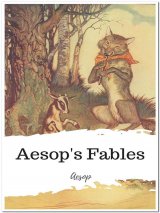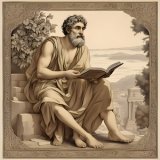Aesop's Fables Page #12
Aesop's Fables, or the Aesopica, is a collection of fables credited to Aesop, a slave and storyteller believed to have lived in ancient Greece between 620 and 564 BCE.
The want of a good excuse never kept a villain from crime. THE HARE AND THE TORTOISE A Hare was one day making fun of a Tortoise for being so slow upon his feet. "Wait a bit," said the Tortoise; "I'll run a race with you, and I'll wager that I win." "Oh, well," replied the Hare, who was much amused at the idea, "let's try and see"; and it was soon agreed that the fox should set a course for them, and be the judge. When the time came both started off together, but the Hare was soon so far ahead that he thought he might as well have a rest: so down he lay and fell fast asleep. Meanwhile the Tortoise kept plodding on, and in time reached the goal. At last the Hare woke up with a start, and dashed on at his fastest, but only to find that the Tortoise had already won the race. Slow and steady wins the race. THE SOLDIER AND HIS HORSE A Soldier gave his Horse a plentiful supply of oats in time of war, and tended him with the utmost care, for he wished him to be strong to endure the hardships of the field, and swift to bear his master, when need arose, out of the reach of danger. But when the war was over he employed him on all sorts of drudgery, bestowing but little attention upon him, and giving him, moreover, nothing but chaff to eat. The time came when war broke out again, and the Soldier saddled and bridled his Horse, and, having put on his heavy coat of mail, mounted him to ride off and take the field. But the poor half-starved beast sank down under his weight, and said to his rider, "You will have to go into battle on foot this time. Thanks to hard work and bad food, you have turned me from a Horse into an ass; and you cannot in a moment turn me back again into a Horse." THE OXEN AND THE BUTCHERS Once upon a time the Oxen determined to be revenged upon the Butchers for the havoc they wrought in their ranks, and plotted to put them to death on a given day. They were all gathered together discussing how best to carry out the plan, and the more violent of them were engaged in sharpening their horns for the fray, when an old Ox got up upon his feet and said, "My brothers, you have good reason, I know, to hate these Butchers, but, at any rate, they understand their trade and do what they have to do without causing unnecessary pain. But if we kill them, others, who have no experience, will be set to slaughter us, and will by their bungling inflict great sufferings upon us. For you may be sure that, even though all the Butchers perish, mankind will never go without their beef." THE WOLF AND THE LION A wolf stole a lamb from the flock, and was carrying it off to devour it at his leisure when he met a Lion, who took his prey away from him and walked off with it. He dared not resist, but when the Lion had gone some distance he said, "It is most unjust of you to take what's mine away from me like that." The Lion laughed and called out in reply, "It was justly yours, no doubt! The gift of a friend, perhaps, eh?" THE SHEEP, THE WOLF, AND THE STAG A Stag once asked a Sheep to lend him a measure of wheat, saying that his friend the Wolf would be his surety. The Sheep, however, was afraid that they meant to cheat her; so she excused herself, saying, "The Wolf is in the habit of seizing what he wants and running off with it without paying, and you, too, can run much faster than I. So how shall I be able to come up with either of you when the debt falls due?" Two blacks do not make a white. THE LION AND THE THREE BULLS Three Bulls were grazing in a meadow, and were watched by a Lion, who longed to capture and devour them, but who felt that he was no match for the three so long as they kept together. So he began by false whispers and malicious hints to foment jealousies and distrust among them. This stratagem succeeded so well that ere long the Bulls grew cold and unfriendly, and finally avoided each other and fed each one by himself apart. No sooner did the Lion see this than he fell upon them one by one and killed them in turn. The quarrels of friends are the opportunities of foes. THE HORSE AND HIS RIDER A Young Man, who fancied himself something of a horseman, mounted a Horse which had not been properly broken in, and was exceedingly difficult to control. No sooner did the Horse feel his weight in the saddle than he bolted, and nothing would stop him. A friend of the Rider's met him in the road in his headlong career, and called out, "Where are you off to in such a hurry?" To which he, pointing to the Horse, replied, "I've no idea: ask him." THE GOAT AND THE VINE A Goat was straying in a vineyard, and began to browse on the tender shoots of a Vine which bore several fine bunches of grapes. "What have I done to you," said the Vine, "that you should harm me thus? Isn't there grass enough for you to feed on? All the same, even if you eat up every leaf I have, and leave me quite bare, I shall produce wine enough to pour over you when you are led to the altar to be sacrificed." THE TWO POTS Two Pots, one of earthenware and the other of brass, were carried away down a river in flood. The Brazen Pot urged his companion to keep close by his side, and he would protect him. The other thanked him, but begged him not to come near him on any account: "For that," he said, "is just what I am most afraid of. One touch from you and I should be broken in pieces." Equals make the best friends. THE OLD HOUND A Hound who had served his master well for years, and had run down many a quarry in his time, began to lose his strength and speed owing to age. One day, when out hunting, his master started a powerful wild boar and set the Hound at him. The latter seized the beast by the ear, but his teeth were gone and he could not retain his hold; so the boar escaped. His master began to scold him severely, but the Hound interrupted him with these words: "My will is as strong as ever, master, but my body is old and feeble. You ought to honour me for what I have been instead of abusing me for what I am." THE CLOWN AND THE COUNTRYMAN A Nobleman announced his intention of giving a public entertainment in the theatre, and offered splendid prizes to all who had any novelty to exhibit at the performance. The announcement attracted a crowd of conjurers, jugglers, and acrobats, and among the rest a Clown, very popular with the crowd, who let it be known that he was going to give an entirely new turn. When the day of the performance came, the theatre was filled from top to bottom some time before the entertainment began. Several performers exhibited their tricks, and then the popular favourite came on empty-handed and alone. At once there was a hush of expectation: and he, letting his head fall upon his breast, imitated the squeak of a pig to such perfection that the audience insisted on his producing the animal, which, they said, he must have somewhere concealed about his person. He, however, convinced them that there was no pig there, and then the applause was deafening. Among the spectators was a Countryman, who disparaged the Clown's performance and announced that he would give a much superior exhibition of the same trick on the following day. Again the theatre was filled to overflowing, and again the Clown gave his imitation amidst the cheers of the crowd. The Countryman, meanwhile, before going on the stage, had secreted a young porker under his smock; and when the spectators derisively bade him do better if he could, he gave it a pinch in the ear and made it squeal loudly. But they all with one voice shouted out that the Clown's imitation was much more true to life. Thereupon he produced the pig from under his smock and said sarcastically, "There, that shows what sort of judges you are!"
Translation
Translate and read this book in other languages:
Select another language:
- - Select -
- 简体中文 (Chinese - Simplified)
- 繁體中文 (Chinese - Traditional)
- Español (Spanish)
- Esperanto (Esperanto)
- 日本語 (Japanese)
- Português (Portuguese)
- Deutsch (German)
- العربية (Arabic)
- Français (French)
- Русский (Russian)
- ಕನ್ನಡ (Kannada)
- 한국어 (Korean)
- עברית (Hebrew)
- Gaeilge (Irish)
- Українська (Ukrainian)
- اردو (Urdu)
- Magyar (Hungarian)
- मानक हिन्दी (Hindi)
- Indonesia (Indonesian)
- Italiano (Italian)
- தமிழ் (Tamil)
- Türkçe (Turkish)
- తెలుగు (Telugu)
- ภาษาไทย (Thai)
- Tiếng Việt (Vietnamese)
- Čeština (Czech)
- Polski (Polish)
- Bahasa Indonesia (Indonesian)
- Românește (Romanian)
- Nederlands (Dutch)
- Ελληνικά (Greek)
- Latinum (Latin)
- Svenska (Swedish)
- Dansk (Danish)
- Suomi (Finnish)
- فارسی (Persian)
- ייִדיש (Yiddish)
- հայերեն (Armenian)
- Norsk (Norwegian)
- English (English)
Citation
Use the citation below to add this book to your bibliography:
Style:MLAChicagoAPA
"Aesop's Fables Books." Literature.com. STANDS4 LLC, 2025. Web. 10 Jan. 2025. <https://www.literature.com/book/aesop%27s_fables_316>.




Discuss this Aesop's Fables book with the community:
Report Comment
We're doing our best to make sure our content is useful, accurate and safe.
If by any chance you spot an inappropriate comment while navigating through our website please use this form to let us know, and we'll take care of it shortly.
Attachment
You need to be logged in to favorite.
Log In